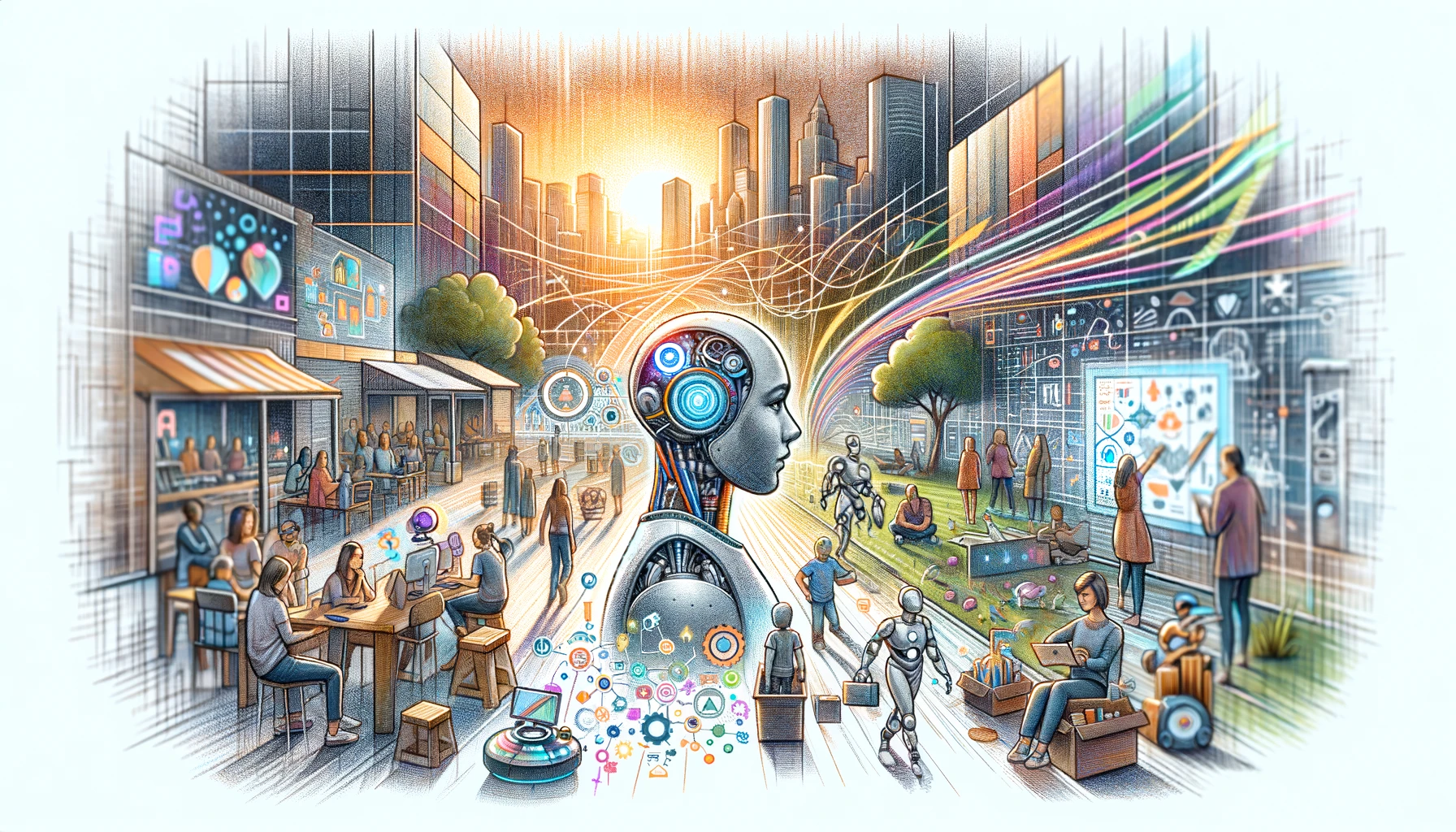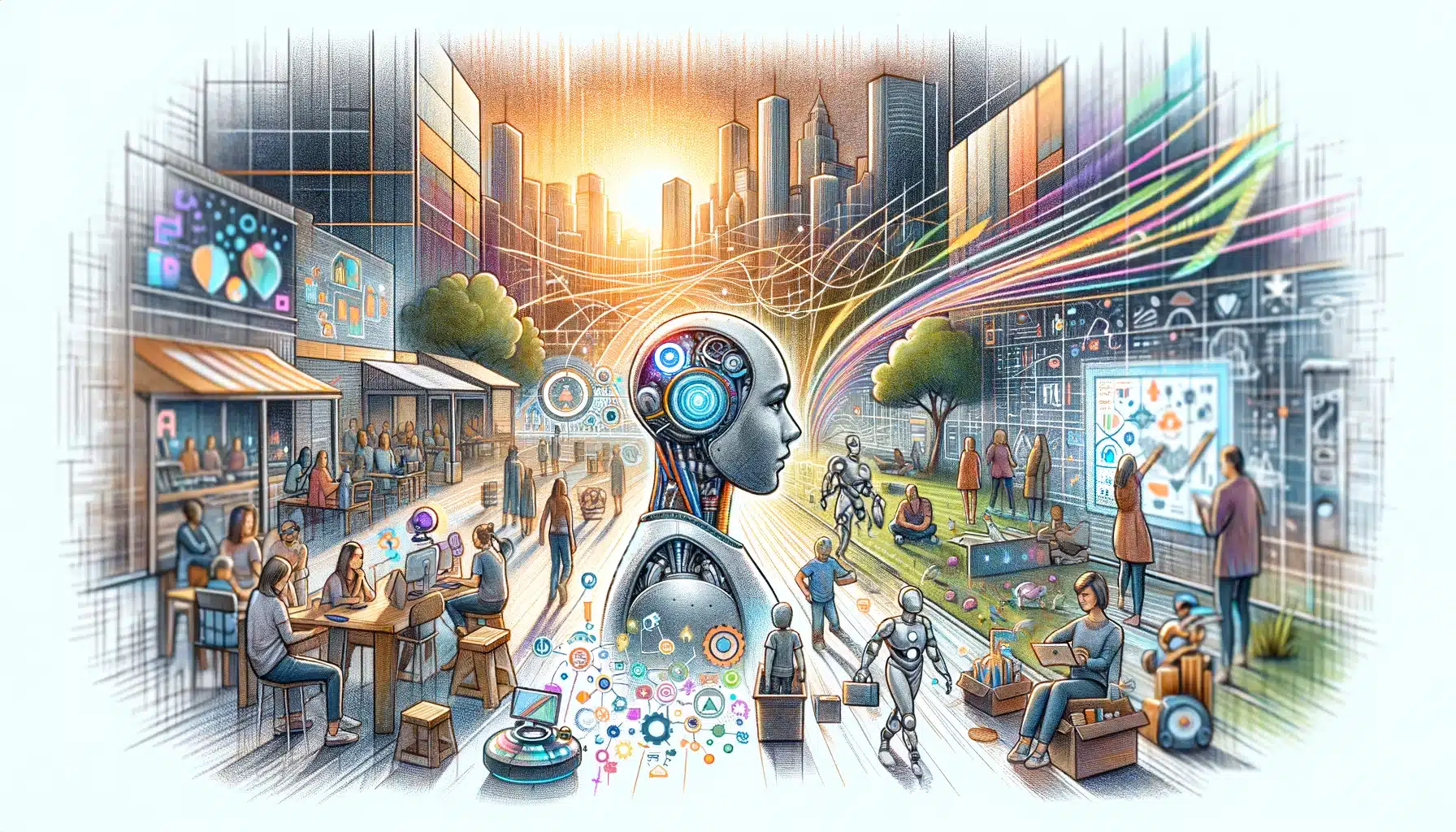Anúncios
In a rapidly advancing digital age, no technological evolution has sparked more interest and anticipation than Artificial Intelligence (AI). Far from the confines of science fiction, AI has taken a central role in shaping our society and business landscapes. This piece aims to delve into the exciting realm of AI, exploring its seismic influence on both social constructs and business operations.
The upcoming discussion explores how AI, with its sophisticated algorithms and data processing prowess, has revolutionized multiple sectors. We will shed light on the profound changes in healthcare, education, transportation, and commerce, narrating the transformation story of the 21st century. The tale of AI is not just about machines and codes, but the intelligent intertwining of humans and technology.
Anúncios
We further aim to highlight the business implications of AI. From streamlining operations to making data-driven decisions, AI is restructuring the traditional paradigms of business conduct. At the intersection of technology and business, AI stands as a game-changer, an unmatched tool promising unparalleled growth and efficiency.
Yet, with great power comes great responsibility. As we continue to embrace AI’s potential, it becomes essential to understand its ethical implications. Balancing the scales between AI’s breakthroughs and potential drawbacks, the following discourse provides a comprehensive understanding of AI’s role in our lives. Embrace the journey into the captivating world of AI, where technology meets human ingenuity, transforming society and business, as we know it.
Anúncios
The Transformation of Society by AI
The advancement of artificial intelligence (AI) has accelerated rapidly in recent years, with significant implications for every aspect of human life. No longer confined to research labs or futuristic predictions, AI has become deeply embedded in our daily routines—often in ways we may not even realize. It’s quietly reshaping how we interact with technology, make decisions, consume content, and access essential services.
From intelligent personal assistants like Siri, Alexa, and Google Assistant, to the powerful recommendation algorithms that drive our entertainment and shopping experiences on platforms such as Netflix, YouTube, and Amazon, AI is everywhere. These tools analyze our preferences and behaviors in real-time to deliver personalized experiences that seem intuitive but are actually the result of complex machine learning models.
In communication, AI is transforming how we connect with others. Chatbots and virtual agents are now commonplace on websites and apps, offering instant responses and 24/7 customer service. AI-driven translation tools are bridging language gaps, enabling seamless interactions between people from different linguistic backgrounds. Social media platforms use AI to filter content, detect harmful posts, and curate feeds that cater to individual interests, albeit not without controversy regarding echo chambers and information bubbles.
Healthcare has seen some of the most profound changes due to AI integration. Medical professionals are now aided by algorithms capable of diagnosing conditions from imaging scans with remarkable accuracy. Predictive analytics help identify at-risk patients before symptoms become severe, allowing for earlier interventions. AI is even being used in mental health apps that monitor user input to detect signs of anxiety or depression, guiding users toward helpful resources.
In the financial sector, AI enables faster, smarter decisions. Algorithms detect fraudulent transactions in real-time, assess credit risk, and help customers manage their finances through intelligent virtual advisors. Personalized financial planning is becoming more accessible, as AI systems learn from individual behaviors and offer tailored budgeting or investment recommendations.
Transportation is another sector undergoing a quiet revolution. AI powers ride-sharing platforms, optimizes logistics and delivery routes, and is at the heart of the autonomous vehicle movement. Self-driving technology, still in development, promises to reduce traffic accidents, improve mobility for those unable to drive, and redefine urban infrastructure in the long term.
AI’s influence extends into education as well. Adaptive learning platforms analyze student performance to personalize lesson plans, identify learning gaps, and offer targeted content that supports individual learning styles. Virtual tutors and AI-assisted grading are easing the burden on educators while enhancing the student experience.
Even within the home, AI is transforming how we live. Smart home devices powered by AI can learn our habits, adjust lighting and temperature automatically, suggest energy-saving settings, or alert us to potential security breaches. These systems contribute not only to convenience but also to energy efficiency and sustainability.
However, with this growing ubiquity comes a host of ethical considerations. The same AI systems that personalize our digital experiences also collect vast amounts of data, raising concerns about privacy, data security, and consent. Additionally, as AI takes on more roles in decision-making, transparency and accountability become critical. Ensuring these systems are fair, unbiased, and explainable is essential to building public trust.
In sum, AI is not just a technological tool; it is a transformative force reshaping the fabric of modern society. It touches nearly every sector, enhancing efficiency, convenience, and personalization—but also introducing new complexities and responsibilities. As AI continues to evolve, so too must our frameworks for managing its impact, ensuring that its integration into society serves the collective good while safeguarding individual rights and human values.
AI in Healthcare
AI has been a game-changer in healthcare. It’s assisting in diagnosing diseases, predicting patient outcomes, personalizing treatments, and improving drug discovery. For instance, machine learning algorithms are now capable of analyzing medical imaging data to detect early signs of diseases like cancer. This not only facilitates early treatment but also saves lives.
AI’s Impact on Business
In the modern business landscape, artificial intelligence (AI) is not just a buzzword—it’s a transformative force that is reshaping how companies operate, compete, and grow. From startups to multinational corporations, businesses across all industries are increasingly adopting AI to stay ahead of the curve. Whether it’s automating routine tasks, analyzing vast datasets, enhancing customer service, or enabling smarter decision-making, AI is emerging as a critical tool for achieving operational excellence and strategic innovation.
One of the most immediate and impactful uses of AI in business is automation. Repetitive and time-consuming tasks—such as data entry, invoice processing, inventory tracking, and appointment scheduling—can now be handled by intelligent algorithms or robotic process automation (RPA) systems. This not only improves efficiency but also reduces the risk of human error, allowing employees to focus on higher-value activities that require creativity, critical thinking, or interpersonal skills.
AI is also transforming the way businesses handle and interpret data. With the explosion of digital information, companies are inundated with data from various sources—customer behavior, market trends, sales figures, supply chain metrics, and more. AI-powered analytics tools can sift through this data at incredible speed, identifying patterns and insights that would be impossible for humans to detect manually. This enables businesses to make more informed and proactive decisions, optimize their operations, and even anticipate customer needs before they arise.
Customer experience is another area where AI is making a profound impact. AI-driven chatbots, virtual assistants, and recommendation engines are now standard features on many company websites and apps. These tools provide real-time, personalized interactions that enhance user satisfaction and engagement. By using natural language processing and machine learning, AI can understand customer queries, deliver relevant responses, and learn from interactions to improve over time. This not only improves service quality but also reduces the workload on human customer support teams.
AI is also revolutionizing marketing strategies. By analyzing consumer data, AI tools can segment audiences more effectively, personalize campaigns, and optimize the timing and delivery of marketing content. This leads to higher conversion rates, better customer retention, and a more efficient allocation of marketing budgets.
Furthermore, AI supports strategic planning and innovation. Predictive models powered by machine learning can forecast market trends, simulate different business scenarios, and assess the potential outcomes of strategic initiatives. This enables leaders to make better long-term decisions based on data-driven foresight rather than intuition alone.
In sectors like finance, retail, logistics, and manufacturing, AI is already delivering measurable returns. For example, AI algorithms in finance are used for fraud detection, credit risk analysis, and portfolio management. In manufacturing, AI helps with predictive maintenance and quality control, while in retail, it assists with demand forecasting and inventory management.
In essence, AI is not just improving the way businesses operate—it is redefining what is possible. As the technology continues to evolve, the companies that embrace AI with strategic intent and ethical responsibility will be the ones that lead in innovation, profitability, and customer satisfaction in the digital age.
Automation and Efficiency
Artificial intelligence, particularly through machine learning and robotic process automation (RPA), has transformed how businesses manage routine operations. By automating repetitive tasks—such as data entry, scheduling, and reporting—AI streamlines workflows, reduces human error, and accelerates processes. This shift not only boosts overall efficiency but also frees up employees to focus on more strategic, creative, and value-added activities, such as innovation, problem-solving, and customer engagement. As a result, businesses become more agile and productive, positioning themselves for long-term success in an increasingly competitive market.
Customer Service and Personalization
AI-powered chatbots and virtual assistants are revolutionizing customer service. They can handle numerous customer inquiries simultaneously, provide instant responses, and offer personalized solutions. This leads to improved customer satisfaction and loyalty.
Challenges and Considerations
Despite its numerous benefits, the integration of AI into society and business also poses several challenges and ethical considerations. These include job displacement due to automation, privacy concerns, data security issues, and the risk of AI systems making decisions that humans don’t understand or agree with.
Job Displacement
The automation of tasks by AI could lead to job displacement in certain sectors. While AI is expected to create new jobs, there’s also a risk that it might render some occupations obsolete. Therefore, upskilling and reskilling of the workforce is crucial to prepare for the AI-driven future.
Data Privacy and Security
As AI systems collect and analyze vast amounts of data, concerns about data privacy and security arise. Ensuring the safe and ethical use of data is vital, and businesses need to adopt robust data governance practices.
The Future of AI
The future of AI holds immense potential. Advancements in machine learning and deep learning are expected to usher in more sophisticated and autonomous AI systems. These advancements could revolutionize fields such as autonomous vehicles, predictive healthcare, and personalized education.
Autonomous Vehicles
AI is expected to play a pivotal role in the development of fully autonomous vehicles. These vehicles could dramatically transform transportation, reducing accidents caused by human error, improving traffic efficiency, and even reshaping our cities.
Predictive Healthcare
AI could revolutionize healthcare by enabling predictive diagnostics. This means AI systems could predict illnesses before they occur, enabling preventative treatment and improving patient outcomes.
- Personalized Education: AI could tailor education to individual students’ learning styles and pace, improving learning outcomes and inclusivity in education.
Final Words
The impact of AI on society and business is profound and far-reaching. While it presents certain challenges, the potential benefits are immense. With responsible and ethical use, AI has the potential to drive unprecedented progress and prosperity. As we navigate this transformative era, it’s crucial to foster a culture of continuous learning and adaptation, ensuring we can harness the full potential of AI while mitigating its risks.
Conclusion
In conclusion, Artificial Intelligence (AI) is indisputably transforming our society and businesses, signaling a paradigm shift that is nothing short of revolutionary. As we have seen, AI’s influence permeates various sectors, from healthcare to finance, education to transportation, and beyond. This technology’s ability to automate tasks, make precise predictions, and learn from experiences has rendered it invaluable. Nonetheless, the ethical implications and the potential displacement of jobs necessitate a balanced, cautious approach in embracing AI. Hence, it’s essential to create regulatory frameworks to manage potential risks while harnessing AI’s incredible potential. As society continues to evolve with AI, it becomes increasingly evident that the integration of AI is not just beneficial, but indeed crucial for our future. We are undoubtedly on the cusp of an AI revolution, and it’s imperative to foster an environment that encourages its positive impacts while mitigating the negatives. Ultimately, the future of AI is in our hands and how we choose to wield this powerful tool will define our collective future.


